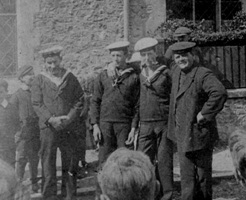Famous for its lace and its limestone quarry, Beer has historically also been one of East Devon’s most important fishing communities.
Said to be descended from the sailors who served under Drake and Raleigh, many fishermen living in Beer at the beginning of the 20th century were in the Royal Naval Reserve almost as a matter of course.
The Reserve was set up a number of years after the practice of “press ganging” unwilling recruits into the Royal Navy was ended. Under an Act of Parliament of 1859, merchant mariners and fishermen were encouraged to sign up, and undergo annual training with the navy to keep their fighting skills up-to-date.
In time of crisis or war, these trained volunteers could be called into action at a moment’s notice.
And so it was, when the clouds of war gathered across the Channel, many men from Beer were called up together – on August 3, 1914, the day before Britain declared war on Germany.

Not only were they called up together, many men from Beer served together in the early days of the war, nine at least went straight to join the crew of HMS Albion, a battleship first commissioned in 1901. Early on in the war she saw action against the Germans in Africa, and then went to the Mediterranean and served in the Dardanelles campaign against Turkey, including the Gallipoli landings.
Reservists from Beer also served together on the battleship HMS Majestic, which saw action in the English Channel in the early months of the war, guarding the coast before moving to the Dover Patrol in December 1914, and then joining HMS Albion in the Dardanelles early in 1915.
Albion survived the war, but sadly Majestic was sunk by the German submarine U-21 on 27 May 1915 with the loss of 40 men. At least two Beer men appear to have been on her at the time, but fortunately were among the survivors.
The men of Beer who gave their lives in the Great War are remembered on a granite cross outside the village's St Michael's Church, and on a wooden tablet inside the building.